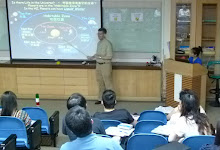I had good discussions with several Harvard astronomers. Some have had long experience with planet transits. They've perfected their abilities to screen out likely transits from imposter eclipsing binary signals. Willy Torres estimated that 90% of apparent planet transits are one of the eclipsing binary "vermin." I should have asked when that percentage is, since it is knocked down in more than one step: a medium telescope radial velocity measurement to exclude stellar companions, and a large telescope radial velocity measurement to actually detect a small radial velocity characteristic of a planet.
There was also some comment that while the Kepler project can be expected to find many planets, it is too easy for people to forget that it only finds planetary candidates that will need to be confirmed by radial velocity measurements that will mostly be done from the ground by large telescopes, and this will take time. No one knows how the screening of unprecedentedly small planets will proceed -- especially since being confined to a small part of the sky, these will not be all of the brightest star candidates. There is talk that we will not have a quick harvest of many, many planets, but that it may take many years to vet the process.

No comments:
Post a Comment